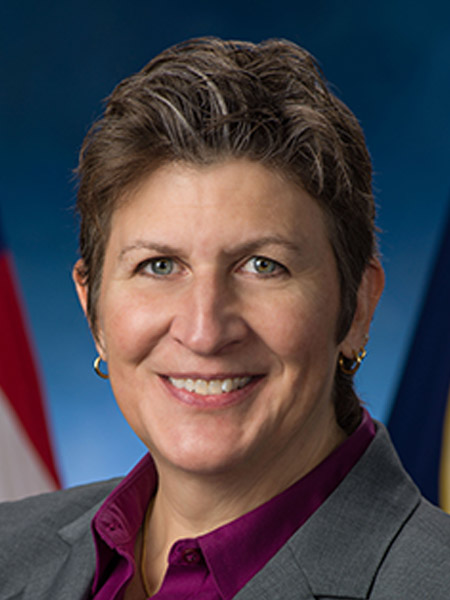Julie A. Kramer White
Director of Engineering, Johnson Space Center, National Aeronautics and
Space Administration (NASA)
BSAAE 1990
For her highly distinguished 35-year career at NASA exemplifying aerospace engineering excellence that was instrumental across the spectrum of human space flight programs.
Julie Kramer White’s 35-year career at NASA has been marked with tremendous successes in the Space Shuttle program, International Space Station, and the Orion Space Program and its Multi-Purpose Crew Vehicle. She has made contributions to every U.S. Human Space Flight program since Shuttle and is a nationally and internationally recognized subject matter expert in spacecraft design, development, test, and evaluation (DDT&E), spacecraft systems engineering, and spacecraft human rating. Yet, the career accomplishment that gives her the most pride is leading the Hardware Forensic Analysis Team following the 2003 explosion of Columbia, to which she had devoted 15 years of work.
“Failure that results in a loss of a flight crew and a vehicle is particularly challenging,” said Kramer White, whose team conducted laboratory testing of the wreckage. “Nothing can prepare an individual for the sense of loss associated with this type of event or the pressure associated with conducting this type of investigation under the microscope of national scrutiny. It was my greatest honor to contribute to this investigation, providing critical evidence in the root cause of the accident and enabling NASA’s safe return to space flight.”
Advancing through numerous influential senior leadership positions at the Johnson Space Center, Kramer White currently serves as a director of engineering in charge of seven divisions and two offices consisting of approximately 2,500 civil servants and contractors with an annual operational budget of around $450 million.
She provided crucial expertise that led to the establishment of the NASA Engineering and Safety Center and subsequently served as its principal engineer. In this role, she was a cohesive force who galvanized teams of technical professionals while investigating and documenting key attributes of spacecraft systems design.
Kramer White has advocated strongly for increased diversity and inclusion in engineering and has actively organized and led leadership development programs and resource groups for engineers from underrepresented groups. She has a long list of NASA medals and awards to her name, including the NASA Johnson Space Center Director’s Commendation (2021 and 2008), and the 2018 NASA Federal Engineer of the Year from the National Society of Professional Engineers.
She is a regular visitor at Purdue, where she interacts with both students and faculty through participation in Old Masters, the School of Aeronautics and Astronautics (AAE) Industry Advisory Council, the Women in Engineering Program, and AAE senior seminar. In 2017, she was named an Outstanding Aerospace Engineer.
Asked to share her Purdue moment of epiphany, Kramer White said it happened while she was completing a co-op experience at Johnson Space Center. A native of Indiana, she had dreamed of attending MIT or Stanford, not realizing how fortunate she was to have Purdue in her own backyard.
As she circulated among her new workmates, she introduced herself and explained that she was from Purdue and made sure to clarify that it was located in Indiana. “One of the senior engineers pulled me aside and said, ’We know where Purdue is … in fact, I couldn’t get into Purdue … so stop saying that.’ Since that moment, I have observed, and grown in admiration of, the role that Purdue graduates have played in NASA’s storied history.”
Career Highlights
| 2021-present |
Director, Engineering, Johnson Space Center, National Aeronautics and Space Administration (NASA) |
|---|---|
| 2017-present | Deputy Director, Engineering, Johnson Space Center, NASA |
| 2006-2017 | Chief Engineering, Orion Project, GS-12/SL, NASA |
| 2005-2006 | Principal Engineering, GS-15, NASA Langley Research Center |
| 2003-2005 |
Mechanical Analysis Technical Discipline Lead, GS-14, NASA Langley Research Center |
| 2001-2003 | Chief Engineer, OMDP, GS-12, Johnson Space Center, NASA |
| 1999-2001 | Technical Assistant, Structures and Mechanics Division, Johnson Space Center, NASA |
| 1991-1999 | Structural Systems Engineer, GS-11/GS-13, Johnson Space Center, NASA |
Education
| 1990 | BS Aeronautics and Astronautics, Purdue University |
|---|---|
| 1995 | MS Mechanical Engineering, University of Utah |

